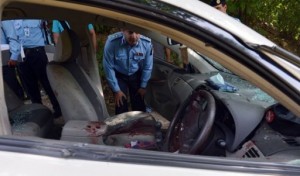
By Nasir Jaffry (AFP) – ISLAMABAD — Pakistan’s main state prosecutor in the 2007 murder of former prime minister Benazir Bhutto and the 2008 Mumbai attacks was shot dead in Islamabad en route to court Friday, police said.
Chaudhry Zulfiqar was shot multiple times after gunmen intercepted his vehicle shortly after he left home in a busy, middle-class neighbourhood of the capital. His bodyguard was also wounded and a woman passer-by killed.
The assassination comes just days before Pakistan holds historic general elections on May 11, marking the first time that a civilian government completes a full-term in office and hands over to another at the ballot box.
“Chaudhry Zulfiqar was driving his car. He lost control and the car crushed a woman passer-by,” police officer Mohammad Yousuf told AFP.
“Zulfiqar was rushed to hospital where he succumbed to his injuries,” he added.
Police said the gunmen fled on a motorbike.
Zulfiqar’s white Toyota Corolla was badly damaged in the attack.
Its wind shield was smashed and there were multiple bullet marks on both sides of the car and at the front. Pieces of broken window lay inside and on the road. There was blood on the car seats and on the road, an AFP reporter said.
Police said it appeared the attackers targeted his car soon after Zulfiqar took a U-turn after leaving his street.
He lost control and the car skidded into a depression along the main road after hitting the woman, who died instantly, officers said.
Zulfiqar had been on his way to the anti-terrorism court hearing the Bhutto case in the neighbouring city of Rawalpindi.
Former military ruler Pervez Musharraf was this week placed under two-week house arrest over charges that he conspired to murder Bhutto.
Zulfiqar was also the main government prosecutor who indicted seven alleged conspirators in the 2008 Mumbai attacks, which killed 166 people and which were blamed on Pakistan’s Islamist group Lashkar-e-Taiba.
Pakistan indicted the seven in 2009 but has since said it needs to gather more evidence in India before proceeding further.
India accuses Lashkar-e-Taiba of training, equipping and financing the attack with support from “elements” in the Pakistani military.
Zulfiqar was given extra government security last year after he was implicated in threats received by police investigators.
It was not immediately clear who was responsible for the shooting.
“I cannot comment. I’m in a state of shock,” Zulfiqar’s deputy Azhar Chaudhry told AFP when asked to comment.
Wasim Khawaja, spokesman for Islamabad’s main government-run PIMS hospital, told AFP that Zulfiqar’s bodyguard was out of danger.
Nobody has ever been convicted or jailed for Bhutto’s assassination in a gun and suicide attack after a campaign rally in Rawalpindi on December 27, 2007.
Musharraf’s government blamed the killing on Pakistani Taliban chief Baitullah Mehsud, who denied any involvement and was killed in a US drone attack in 2009.
Bhutto’s son, Bilawal Bhutto Zardari, who is chairman of the outgoing main ruling Pakistan People’s Party, has accused Musharraf of her murder.
In 2010 a UN report said Bhutto’s death could have been prevented and accused Musharraf’s government of failing to give her adequate protection.
Musharraf, who ruled from 1999-2008, returned to Pakistan on March 24 to contest next week’s general election, but has been barred from running for parliament over a series of legal cases dating back to his time in office.
He was first put under house arrest for sacking judges in 2007 when he imposed emergency rule, before also being detained in the Bhutto case.
On Thursday, he was questioned by police over the death of a Baluch rebel leader, who died during a military operation ordered by Musharraf in 2006.



